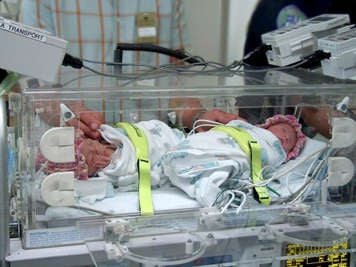Depending on how premature or sick a baby is at birth and where the expertise is located to care for them, it may be necessary for the baby to be transported to a specialized facility called a neonatal intensive care unit (NICU).

NICUs are designed and equipped to support premature and full-term newborns who need specialized medical care. Many babies can be cared for in level 2 NICUs in the community with support from the tertiary (level 3) centres. However, the level 3 centres provide the highest level of expertise. Babies who require level 3 care are transported by specially trained teams, usually in a land ambulance, though sometimes a helicopter or other fixed-wing aircraft will be used for longer-distance transports.
Sometimes, a pregnant individual can be transported before delivery to a hospital with a tertiary NICU so that the baby will not need to be transported after delivery. Ideally, all high-risk premature births should occur in a tertiary centre to provide the best opportunity for the baby to have the best outcome. However, to avoid the risk of the baby being delivered enroute to the perinatal centre, more frequently, transportation is instead arranged for the premature baby very quickly after the birth.
Neonatal transport, whether by land or air, is a highly specialized service specifically designed with the newborn baby in mind.
How neonatal transport works
Generally speaking, NICUs are located in major centres such as cities and bigger towns. A newborn baby requiring support, premature or not, will be sent to such a facility. For those already near an NICU, transport will be by road ambulance. For those farther away, transport may be by road, but an air ambulance—either a helicopter or fixed-wing aircraft—is preferred for distance transports.
No matter the mode of transportation, each vehicle is specially equipped with the necessary life support equipment and specially trained health-care providers. The neonatal transport team (which usually includes nurses and respiratory therapists) has expertise in transporting ill newborns between facilities and will make sure the baby is stabilized before preparing them for transport. Depending on the condition of the baby, this may mean assisting the baby with breathing, inserting intravenous lines to provide fluid and dextrose (sugar), and giving medications, such as antibiotics or medications that help the lungs and heart to function. All small babies are placed into a special transport incubator to help maintain their body temperature. The neonatal transport team will then transport the baby to a hospital that provides a higher level of care.
The parents
At least one parent is encouraged to be with their baby in the ambulance during the transport. This is a little more challenging in an aircraft where the number of seats may be limited. Depending on the condition of the birthing parent, it may not be possible for either of the parents to accompany their newborn baby in the same vehicle.
Birth, even under the most ideal circumstances, is an intensely emotional experience. An unexpected premature birth or emergency with their term-born baby quickly followed by separation from the baby is often very difficult for parents. It may take some time before the family is reunited with their baby, depending on factors such as:
- the condition of the birthing parent
- how easy it is to accommodate other family challenges, such as child care
- the distance between where the birth took place and the destination NICU
The first thing to remember is that the entire system of transporting newborn babies is designed to ensure their health. While one or both parents may not be able to travel with their newborn baby to the NICU, they will have an excellent transport team that is always focused on providing family-centered care. Staff at the hospital will try to help parents reunite with their newborn baby at the earliest possible moment.
